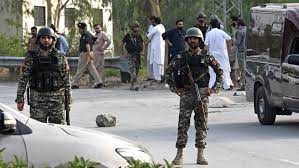Pakistani security forces have reported the killing of 30 militants, labeled as “Indian-sponsored Khawarij”, during a high-intensity clash at the Pak–Afghan border. The successful counter‑infiltration operation thwarted an attempted cross-border militant incursion and allowed security agencies to seize significant weaponry and explosive devices.
Incident Overview
- Location of Operation:
The operation was conducted in the border region of South Waziristan, a known transit zone for militant networks. - Militant Casualties:
Pakistani security forces confirmed 30 militants were killed in the firefight, while an unknown number successfully retreated into Afghan territory. - Captured Equipment:
Authorities recovered a large cache of weapons including light and medium arms, hand grenades, and bomb-making material indicating preparation for coordinated attacks.
Allegations of Foreign Backing
- Indian Sponsorship Claim:
Security officials labeled the militants as “Indian-sponsored,” citing intercepted communications and recovered documents that allegedly signaled cross-border support aimed at destabilizing Pakistan’s western province. - Khawarij Identification:
The term “Khawarij” is used to describe extremists rejecting moderate Islamic beliefs in favor of violent militancy, reinforcing the ideological framing of the threat. - Diplomatic Tensions:
This accusation is likely to impact Pakistan–India relations, giving Islamabad grounds to lodge formal complaints over alleged cross-border interference.
Operational Details & Security Protocol
- Intelligence Cooperation:
The operation resulted from actionable intelligence shared among local police, Frontier Corps, and federal agencies aiming to preempt militant infiltration. - Tactical Engagement:
Security forces executed a joint cordon and search operation, erupting in intense combat that culminated in the militant suppression and weapon recovery. - Follow-up Measures:
Authorities continue combing nearby border areas and tracking suspicious gatherings to ensure no further infiltration occurs.
Regional Security Implications
- Border Vulnerabilities Highlighted:
The event underscores persistent risks in the porous Pak–Afghan frontier, where militant groups seek entry into Pakistani territory. - Escalation Concerns:
Allegations of Indian backing may raise geopolitical tensions, triggering diplomatic protests and demands for accountability. - Intensified Surveillance:
Pakistan has reportedly upgraded border patrols, aerial reconnaissance, and intelligence monitoring to deter future incursions.
What Comes Next
- Evidence Analysis:
Intelligence agencies will interrogate recovered materials to uncover links, funding patterns, and operational networks supporting the militants. - Enhanced Border Security:
Plans include erecting border fencing in high-risk sectors, increasing deployment of Rangers and Frontier Corps, and integrating unmanned surveillance systems. - Diplomatic Channels:
Islamabad is expected to raise the matter formally with India through diplomatic channels, demanding clarification and accountability for alleged interference. - Community Preparedness:
Local border communities are being urged to report unusual movements or activity, with awareness campaigns aimed at reducing militant sympathies.



Comments (0)
No comments yet. Be the first to comment!
Leave a Comment